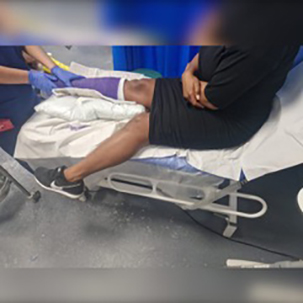My Achilles rupture injury and non-surgical recovery process

In December 2022, I ruptured my Achilles tendon while playing an interactive football game. It was a devastating injury and I knew immediately what had happened when I heard the loud pop and the sudden feeling that I had been kicked.
In A&E an ultrasound confirmed that I had ruptured my Achilles tendon. After weighing up the pros and cons I decided to pursue a non-surgical recovery. I knew it would be a long and challenging process, but I was determined to do everything I could to be active again.
My recovery process began with a period of immobilisation. I wore a plaster cast for two weeks to allow the tendon to heal. During this time, I focused on rest, as using crutches was very difficult. The plaster team at Kings College Hospital were also very helpful and understanding during my visits.
Once the cast was removed, I started using a Vacoped walking boot to help protect my ankle, provide support but also allowed me to walk again. I also found that using an EvenUp shoe balancer to correct my limb length discrepancy helped to prevent back and hip pain.
Over the next few months, I continued to progress with my physical therapy and gradually increased my activity level. I also had low level laser therapy weekly at Dulwich Podiatry which helped to reduced swelling and pain in the tendon. I knew that I had to be patient and listen to my body in order to make a full recovery and not re-rupture the tendon.
After about six months of non-surgical recovery, I was finally able to return to light exercises and gain confidence again.
My non-surgical Achilles rupture recovery was a long and challenging process, but it was ultimately successful. I am grateful that I was able to avoid surgery and make a full recovery.
Here are some tips for other people who are considering a non-surgical recovery from an Achilles rupture:
- Be patient. It takes time for the tendon to heal. Don’t rush your recovery, or you risk re-injuring yourself.
- Listen to your body. If you’re feeling pain, stop and rest. Don’t push yourself too hard.
- Be consistent with your rehab and physiotherapy as it is important for strengthening the muscles around your ankle and preventing atrophy.
- Be positive. A positive attitude will help you stay motivated and focused on your recovery.
If you’re facing an Achilles rupture injury, know that it is possible to make a full recovery without surgery. With patience, dedication, and hard work, you can get back to your active lifestyle.
By Michaela Shaw



